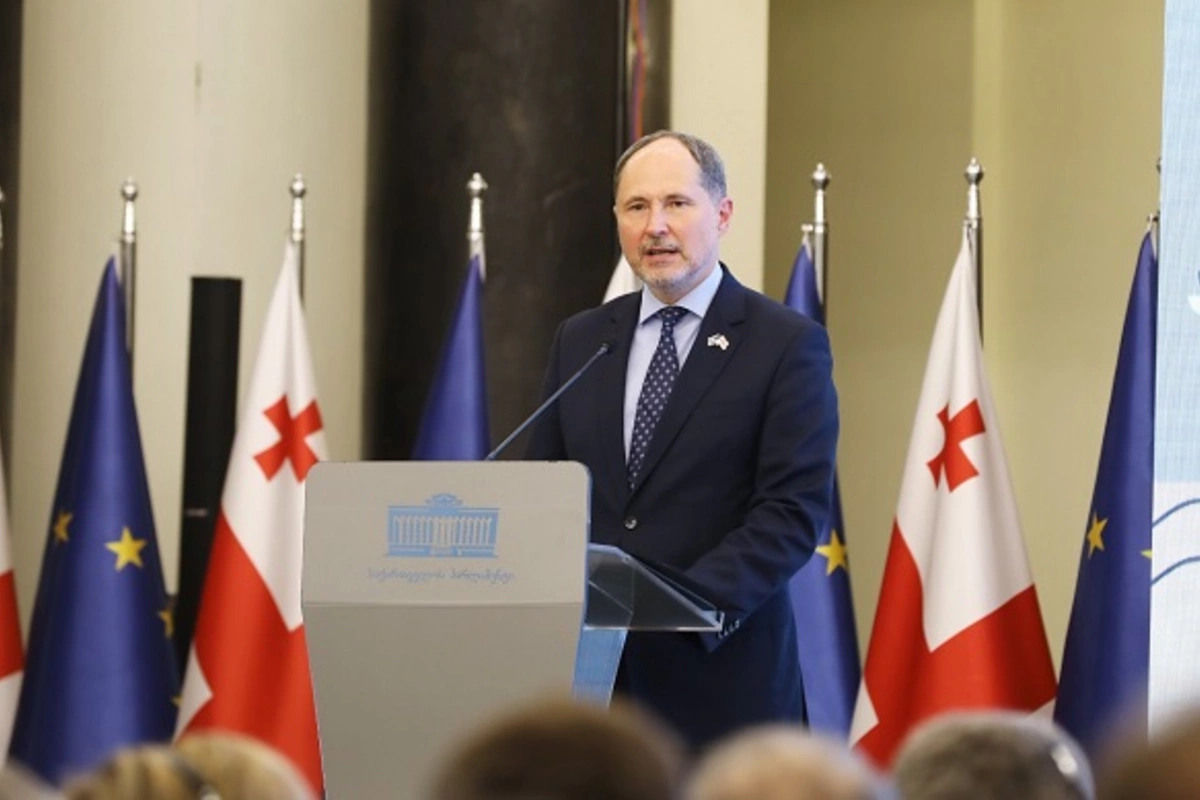
EU Ambassador Pawel Herczynski announced that the EU will review and may suspend Georgia's visa-free regime due to the new "foreign agents" law, impacting citizens' travel and cooperation.
Image: mepa.gov.ge
(JAMnews) EU Ambassador to Georgia, Pawel Herczynski, stated that following the adoption of the “foreign agents” law, the simplified visa regime between Georgia and the European Union will be reviewed and possibly suspended.
“We agreed on visa regime liberalization with Georgia, but under certain conditions. And now, after the adoption of the law on foreign influence transparency, we need to verify if the conditions for visa liberalization apply to Georgia.
The suspension of visa liberalization for six months requires the approval not of all EU member states, but of the majority. And I am confident that this will be considered as one of the options, and the member states will make a decision.
My concern as an EU ambassador is that if visa liberalization is suspended, it will harm the citizens [of Georgia], and this is definitely not the goal of the European Union. This is my opinion, but the decision will be made by the member states in the coming weeks,” stated Pawel Herczynski.
The Government of Georgia states that, despite the issues, there is no danger in reconsidering visa liberalization at this stage.
Visa-free travel between Georgia and EU countries came into effect on March 28, 2017.
• The European Union reserves the right to activate the so-called “suspension mechanism” of visa-free travel in case Georgia fails to fulfill its obligations.
• Georgians seeking asylum in Europe most often cite unemployment as the reason. Also, many Georgians travel to Europe for health reasons, indicating problems in the country’s healthcare system.
• Georgian crime remains a significant issue in Europe. Germany, in particular, has complained about this and has even asked the Georgian Minister of Internal Affairs to take some measures.
• The law on transparency of foreign influence was adopted by the ruling party “Georgian Dream” in the third reading on May 28.
• The Georgian authorities passed this law despite large-scale protest demonstrations, persistent calls from Western partners, and a strict opinion from the Venice Commission of the Council of Europe.
• After the law was passed, the U.S. began discussing sanctions against the government of the “Georgian Dream.” On May 23, Secretary of State Antony Blinken announced sanctions against members of the Georgian government, as well as financial sanctions.
• The EU is also considering retaliatory measures against the Georgian government.
• The main argument of the Georgian authorities is that similar laws exist in the United States and some European countries, including France. According to the “Georgian Dream,” each country has the right to protect itself from foreign influence and demand transparency from its organizations.
However, comparing the law adopted by the “Georgian Dream” with the American or European ones is incorrect because:
The American law FARA (Foreign Agents Registration Act), to which the “Georgian Dream” appeals, was adopted in 1938, before World War II, to protect the American population from Nazi propaganda. Neither then nor now does FARA apply to U.S. allies and friendly countries.
As for the law “On the influence of foreign states,” which operates in France, there is a specific list of countries to which this law applies and whose increased influence France considers a threat (Russia, China, Turkey, Iran). At the same time, it is particularly noted that this law does not apply to EU countries. In the Georgian law, there is no such provision, and consequently, this law directly affects organizations funded by friendly and partner countries of Georgia – the U.S. and the EU – through which democratic processes are developing in the country.
Furthermore, in FARA and some other laws of this type, it is stipulated that they do not apply to media or NGOs, only to lobbying organizations. There is no such provision in the law adopted in Georgia.
Overall, the Georgian law is similar to the Russian one, which also primarily affected the media and the non-governmental sector. As a result, all non-governmental and media organizations not controlled by the Kremlin were closed in Russia.
It is also important to note that the law adopted in Georgia contradicts EU legislation. When a similar law was adopted in Hungary, it was annulled by the European Court of Human Rights because it was directly aimed at silencing the media and persecuting NGOs.
Establishing such restrictions on friendly partner countries raises concerns that Georgia is changing its foreign policy vector. These concerns are voiced unanimously today by independent Georgian experts, politicians, and representatives of civil society.
The main slogan of the mass protests against the “foreign agent” law is “Yes to Europe, No to Russia!”
The law will come into effect, probably by September, when a special register is ready, in which organizations-“foreign agents” must register.
All organizations, more than 20% of whose funding comes from foreign grants, will be declared foreign agents. In Georgia, a small and poor country, this is almost an absolute majority of non-governmental organizations.
For 33 years of independence, with the help of the EU and the U.S., vital projects have been implemented in all spheres of the country – from healthcare and infrastructure to strengthening civil society.
Now, many media and NGOs are refusing to register as foreign agents because such a label is offensive. “We work honestly in our country, why should we be called ‘carriers of the interests of a foreign state’?” they ask.
Some small organizations have already announced their imminent closure or the suspension of projects. For example, the non-governmental organization Fea Trees Foundation announced that, due to the adoption of this law, the project to open a free children’s dental clinic is being suspended.
Animal rights activists have also made a statement that almost all animal protection organizations in Georgia exist on foreign grants, and if this law comes into force, a significant portion of them will be closed.
Share on social media